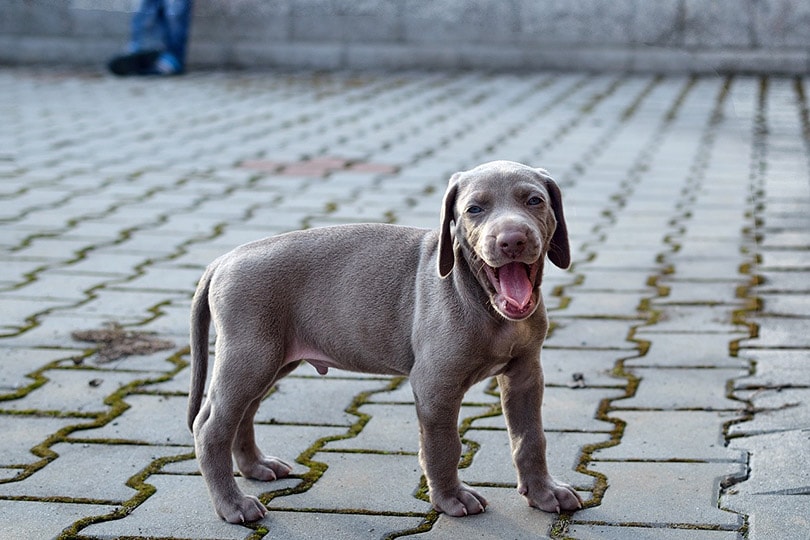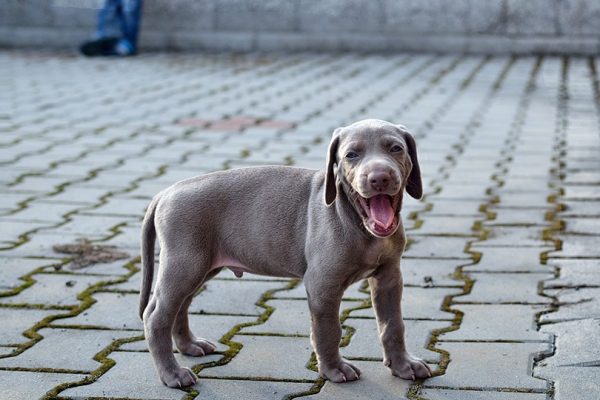Click to Skip Ahead
Giving your puppy a bone seems like a natural gesture. After all, dogs and bones tend to go hand-in-hand with one another. However, not everything natural is good, safe, or healthy for dogs, especially growing puppies. So, is a bone a sensible option to offer a puppy to chew on?
Unfortunately, letting your puppy chew on a bone is not the best idea. This is not to say there isn’t a bone-feeding option for puppies—there is. But for the record, feeding bones to your dog generally is something best left to adult dogs, and only under close supervision. For now, let’s investigate puppies chewing bones and what safety precautions to take.
Puppy Teething
Puppies begin losing their baby teeth around 3-4 months old, and you should find that by around the time they are 6-7 months old, all their adult teeth have come through.
Throughout the teething cycle, you may find that your puppy will want to chew—a lot! They may like to chew on a lot of different items, many of which they perhaps shouldn’t, and it is prudent, therefore, to provide appropriate chewing materials for them.
Puppies chew because it feels nice on their inflamed gums and helps to ease the discomfort and irritation of the new teeth pushing through. You may want to offer your puppy a bone to help this process and because they will most likely enjoy it, but this needs careful consideration, as most bones are not suitable for young puppies to gnaw on.
For this reason, you will also find a suitable list with alternative suggestions that your puppy can safely chew on toward the end of this article.

What Bones Can a Puppy Have?
Before giving your puppy a bone of any kind, speak to your veterinarian. Feeding your puppy a large, raw bone is not a choice without risk. Some vets agree with offering raw bones and some don’t.
If you and your vet feel that it’s safe to offer your pup a bone, then a raw bone larger than your puppy’s mouth is the safest idea. You’ll also want one that’s preferably rounded without sharp edges that can cut their tiny mouths.
Introduce the large bone slowly and give it in short, supervised spurts. Offering it to them after a meal is a good practice, as they should be already full of their dinner and less likely (hopefully) to chew so fast. Keep the bone in the fridge once you remove it from their reach, and throw it away after 3–4 days.
Do not ever give dogs cooked bones, as they are more likely to splinter and cause serious health concerns.
The Dangers of Feeding Bones
Numerous potential issues exist for dogs when it comes to chewing on all bones. It is worth familiarizing yourself with these to help evaluate if giving your puppy a raw bone to chew is worth it.
- Raw bones carry the risk of bacterial contamination which can make your puppy sick.
- Bits of raw bone can chip off, be swallowed, and become stuck anywhere along the gastrointestinal tract, possibly causing a blockage or injury.
- Teeth can fracture or chip. Although enamel is exceptionally tough, a tooth can still break or chip when chewing hard surfaces like bone.
- Bits of bone can break off and stick in between their teeth or in and around the tissues of the mouth, causing pain, difficulty eating, and potential infection.
- Any bone is a choking hazard.
- Cooked bones should never be fed, as these easily splinter and can become stuck along the digestive tract, or they can pierce any portion of it: the mouth, esophagus, stomach, and intestines are all susceptible to this dangerous incident.
- Some bones can contain a lot of fat and can potentially cause digestive issues or even pancreatitis.
Safe Items Your Puppy Can Chew On
There are plenty of other products that may be better for your pup to chew on, such as:
- Puppy teething toys (some can also be placed in the freezer, as the coldness helps hot and inflamed gums)
- Food-stuffable puppy toys
- A frozen washcloth or ice cube
If you have any questions about what your puppy should be chewing on, speak to your vet. You may also want to look into products that have received a Veterinary Oral Health Council seal of approval to help ensure their safety.
While your puppy is chewing on any of these items, be sure to keep these tips in mind:
- Keep valuables or inappropriate items out of their reach.
- Keep dangerous items out of their reach, such as electric wires.
- Use a crate to help prevent chewing on personal items for when you cannot supervise them closely.
- Ensure they are being fed enough and are not hungry or thirsty. They grow rapidly at young ages, so be sure you’re adjusting their food amounts accordingly.
- Teach them “leave it” or “drop it” commands to keep control over what is in their mouths.
- Provide enough exercise and mental enrichment activities to prevent boredom. A bored mind will find something to do, and often, it may be an activity you do not want!
Conclusion
Letting your puppy chew on a raw bone is feasible if your veterinarian also agrees, but it is not without risks. Ultimately, feeding a raw bone to your new pup is a personal choice, but there are many other safer options in our modern world to offer puppies that prevent any injury or illness from occurring.
See Also:
- Benefits Dogs Get from Chewing Bones or Chews
- How to Handle Pet Separation Anxiety as a Pet Sitter: Tips & Tricks
Featured Image Credit: mtajmr, Pixabay











